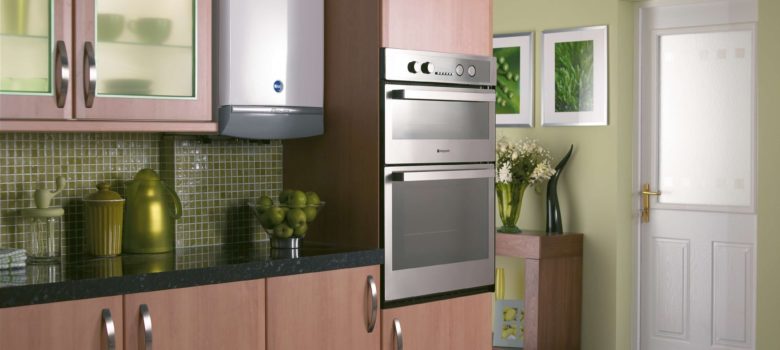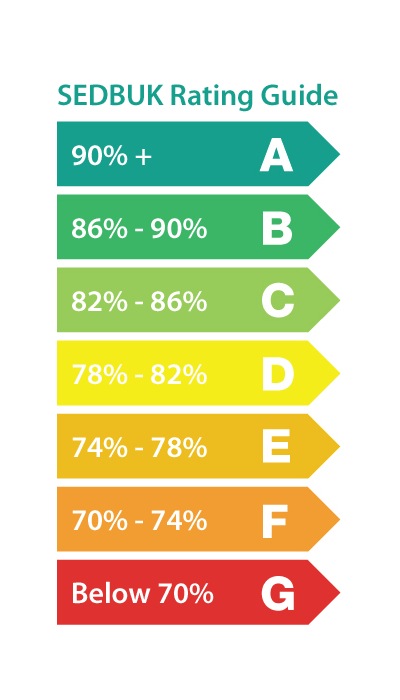
Should I replace my boiler with a new energy efficient model?
This is a question we get all the time from customers. In this blog I intend to show you how to run the numbers to see if it is worthwhile you splashing the cash on a new shiny energy efficient boiler!
You will need two bits of information to allow you to do this. Firstly, the amount of gas in kWh you use per year. Your utility provider should be able to provide you with this figure, or it might even be on your gas bill (although to be honest the energy companies make these a bit of a bugger to read!).
The other thing you need to do is to determine the energy efficiency of your existing boiler. This is a relatively simple process provided you can find the make and model number of your boiler (this is normally on the instructions or on the boiler casing somewhere).
Once you have this – click on the link below:
>>> Check the efficiency of your boiler – click here <<<
 Next to your boiler you will see the SAP2009 annual efficiency rating, which provides you with the efficiency rating of your boiler.
Next to your boiler you will see the SAP2009 annual efficiency rating, which provides you with the efficiency rating of your boiler.
You may be surprised to hear that the European Union are still messing about trying to establish some Europe-wide benchmarking mechanism to measure the efficiency of boilers, therefore we have to refer to the SEDBUK boiler efficiency ratings (which are much more sensible anyway because they simply go A-G rather than have A+, A++ and A+++).
The table can be found on the right, and your boiler should sit somewhere on that scale. So now when someone mentions replacing a ‘G’ rated boiler you actually know what he or she is taking about.
Should I replace my boiler now?
So now you know the energy efficiency rating (both number and banded letter) and the usage, you can do so simple maths to see what kind of financial savings you would make by installing a new boiler. I am going to take you through a worked example using the following 3 assumptions:
- Yearly gas usage: 15,000kWh (slightly lower than the national average)
- Old boiler: Baxi Combi Instant 80e – D rated running at 78.6% efficiency
- New boiler: Baxi Avanta Plus 39c Combi – A rated running at 90.8% efficiency
See below if the numbers stack up for you!
Step 1: Calculate how much useful heat units my current boiler produces per year
So my current boiler will turn 15,000kWh of gas into 11790 units of useful heat (simply calculated by multiplying 15,000 by 0.786).
Step 2: Find out how many equivalent kWh of gas my new boiler would have to burn to produce the same number of units of useful heat
11,790 divided by 0.908 = 12,984 kWh of gas.
Step 3: Calculate how much less gas you are using by installing new boiler
15,000 minus 12,984 = 2016 kWh less units of gas needed
Step 4: Multiply the units of gas saved by the average cost of gas (4.5p / kWH)
2016 kWh x £0.045 = £90.72 per year saving
Now an average boiler costs about £2,500 to buy and the estimated lifespan of a boiler is 12 – 15 years. So even if you were to replace this today, you are only looking at saving £1,088 over 15 years from replacing it, based on this energy usage.
What if you used 27,000kWh of gas – does that make it worthwhile replacing the boiler?
Old boiler produces 21,222 units of useful heat
New boiler needs 23,372 kWh of gas to produce the same amount of heat
New boiler saves 3627kWh of gas per year.
3627 kWh x 0.045 = £164.24 per year saving
Remember an average boiler costs £2500 to replace, and replacing a D-rated boiler with the A rated boiler detailed above would provide about £1970.88 of savings over the next 12 years (without factoring in any increases in energy prices over that time). You can begin to see that actually it may be worth considering!
The issue is more pronounced however if you are having to pay a yearly sum to keep your boiler alive. Obviously if you are paying £200 a year to get a plumber out to essentially put a plaster on your boiler to get it through another winter then this it becomes an even more attractive proposition.
The key though is to run this calculations for yourself to see if it is worth doing.
In the final table below you can see that I have taken the average efficiency for each band and run the calculations on the average yearly gas usage in the uk – 17,000kWh, so you should be able to see that from upgrading from a band ‘D’ boiler to a band ‘A’ will save you £85 per year will upgrading from a band ‘G’ to a band ‘A’ will save you £170 per year.
Hopefully the blog above has given you the means to decide whether it is worthwhile replacing your boiler with a new more energy efficient one. As I mentioned earlier though we have not taken into account any fuel price rises in this, so if gas continues to rise at 10% a year then the savings will increase significantly.
If you want to give yourself a sense of how much a boiler replacement costs, you may be interested in reading this blog.
If you are considering replacing your boiler, fill in the form below and we will send one of our partnered gas safe engineers to quote for the job.













Thank you for writing this – it really is wonderfully useful. I was sure that my boiler was out of date, but actually was shocked to find it is still running at 86% efficiency, therefore it certainly doesn’t make sense for me to replace it!! A great help – thank you!!
My boiler is 12 years old and having taken a look using the link above is only 73% efficient. My gas usage looks high enough to make it worthwhile I think, especially if I can get a decent warranty on the new boiler. Any recommendations of brands to go? which have suggested Worcestor, but my neighbour has a baxi and says it is very good?
I am still thinking about going air source heat pump or new gas boiler, but this article sets out well what I should look at. What manufacturer would you recommend a good boiler? The price of £1750+VAT does that include the labour or is that just for the boiler. Do I need a gas safety check every year for the warranty? Thank you. Sorry about previously going on about independence, appreciate you are neutral on this.
For that sort of price, you could get a Viessmann 050 Combi Boiler. They’re one of the most efficient and reliable boilers around. Check out Heatable.co.uk as they’ve partnered with Viessmann to offer a 10 year warranty on the product.
I have a Viessmann combi boiler and its very troublesome . Its about 8 years old and has been gradually breaking down for several years and now has stopped working despite numerous visits from heating engineers and spare parts fitted . The original installer is no longer available . Now I am over 80 I am considering leasing a boiler or getting a cheaper one . Veissmann is in the top 3 boilers tested as best buys in Which magazine.. I feel let down as now we have no heating except a convector heater and no hot water.
£1750 + VAT should be all in Grant, and as I said to Tomas, Worcestor and Vaillant our currently our favourites. A yearly gas safe check is a legal requirement if renting the property, but this does not normally have an impact on the warranty – that is not to say we don’t think it is a good idea getting one though!
I thought I had very efficeint boiler, but appears that even though i have a combi, it is not condensing. I thought that all combis were condensing anyway appears not! I think running your calculations above I would only save about £85 a year, but it is more that the boiler has started making funny noises, so I think it is time to make the switch. I would be interested in getting some advice on brands too please.
Hi Tomas, the two leading boiler makes in our opinion at present are Worcestor and Vaillant – they are both worth considering. They will cost a little more, but by paying a little extra you can a really long warranty on both these types of boiler so in our opinion worth doing over paying British Gas Homecare or equivalent.
I have a ideal Mexico 2 boiler and i got it serviced by a british gas engineer about 4 years ago. He said that it was worth replacing because parts would now be difficult to come by. To be honest it has been going 30 years now and it still works fine. The new boilers only last 10 years so if you have one of the older ones that keeps going and going then don’t replace it in my opinion.
We have an Ideal Mexico 2 as well, still going strong at 72% efficiency. We use 27000kwh of gas a year and with EDF Blue Price+ March2017, we’re paying just under 2p per kwh plus 26p a day standing charge inc VAT. Assuming a new boiler is 92% efficient, this will save us a grand total of £111 per year!
We’re sticking with the old reliable Ideal!
Hi Tony, it is an interesting comment, we certainly see a lot of boilers this sort of age in houses. I guess the key here is the efficiency of that specific boiler and how much gas you actually use to heat your home. If you use a lot of gas, then it may make sense to swap it out, but I completely take your point that new boilers don’t have the same sort of lifespan. It would be interesting for you to follow the advice above and see what kind of energy savings you would expect. The other thing is that replacing a floor mounted boiler is not going to be as cheap as swapping a combi boiler for example – they don’t really do many floor mounted boilers anymore and it depends where the flue is located, it is likely that their is going to need to be some pipework alternations. All of these things might increase the cost for you unfortunately.
This is really useful. I have a 7 year old boiler and based on the workings above it would only save me £50 so going to hang on a bit before replacing it! Thanks for the help though!
I would have thought replacing my boiler would save me lots of money, but maybe it isn’t as important as I first thought. How much do you think I would save by changing my old potterton netaheat 10 to a new model? I live in a 2 bed flat. Thanks!
Hi Harry, thanks for your comment – so the potterton netaheat is only 65% efficient – to be honest this is as low as the efficiency goes in the SEDBUK database (all boilers are considered to have an efficiency of this even though this is probably not the case). The boilers final year of manufacture was 1988, so I also think you are approaching the time where you are going to struggle to find parts for the boiler if things go wrong.
In terms of specific savings on your heating bills, since you haven’t provided you annual energy usage I can’t give you an accurate annual saving, but if you heating bill was 15,000kWh (which is about right for a 2 bed flat) then you are looking at a saving of about £200 a year (in theory you should save about 4260kWh of gas each year).
Obviously if you have a warm winter, you will probably use less gas and if the winter is cold then you will use more gas. Remember too that a new boiler installed by a good heating engineer will also come with a minimum 5 year warranty which is nice to have too – since if anything goes wrong in that time you can call them out.
James,
Thanks so much for replying. You have obviously taken some time to think about my flat! £200 a year does seem quite a lot, I think you might be overestimating my usage slightly. I have looked at some combi options and the cost seems to be about £3,000+, so is the payback really worth it? It’s going to take me at least 15 years to pay back isn’t it?
I’m in California at the moment, but I will definitely have a look at a new boiler when I get back, I’m just not 100% convinced that those savings are going to make it worthwhile. Thanks for your help and maybe you can convince me otherwise…
Make sure you keep an eye out for the new GDHIF rates that are being introduced in November. It may make all the difference and mean upgrading your boiler becomes a dead cert.
Hi Henry, do you think it will include the boiler as a one off? I think the last GDHIF scheme made you get it with another measure from what I understand?
Hi Leslie, it is unlikely that you will be able to claim GDHIF when you just want to replace the boiler unfortunately. We know that the Flue gas recovery system has now been removed, so it is likely that you will need to take the boiler + something else to get the grant.
Having said that – the Government may now choose to offer heating controls as the second measure – or make a stand alone (but smaller) grant for people who just want to swap boilers out much like the £400 boiler scrappage scheme from a few years ago.
Hi, I was wondering if I go for a combi boiler now whether I would be worse off then trying to get the solar hot water installed at a later date. I am keen to replace the boiler this winter as it is making a lot of noise and my wife is really worried something may happen – but at the same time I don’t have the money to pay for a new solar system. Wondering if anyone can give me some useful advice.
Hi Kuzman, so the issue here is that solar thermal will need a hot water tank, while a combi boiler won’t (they heat mains water as and when it is required). You may be better off going with a regular heat only boiler and installing this with a dual coil hot water tank – this would allow you to go for solar thermal in the future. It is also worth mentioning that solar thermal would never meet all your hot water demands, especially during the winter months, so we would definitely recommend having a boiler as back up for these times.
As a final point, if you did decide to go for solar thermal in the future you would be able to benefit from the renewable heat incentive which would reward you for every unit of hot water produced from the system.
Thanks all very useful. Do you know roughly how long it takes for the solar hot water system to payback? Could I get some Green Deal to help pay towards it? Sorry to be so demanding for answers I am trying to see if the boiler option is worth going for now.
Hi Kuzman, to be honest with solar hot water it varies considerably from case to case. For example, the RHI payments are higher for homes that have more people living there. For example if a house has 4 bedrooms and 6 people live there, the payments would be higher than for the same house if only 2 people lived there.
A solar thermal system would cost around 3k to install and if you had maximum occupancy (i.e. 6 people living in the house), you would recover the majority of these costs over the 7 years through the RHI, however solar thermal will only provide all your hot water during the summer months, so the actual energy savings aren’t enormous.
Hi James, this is absolutely true! if you are looking to go for solar thermal in the near future and you are about to swap your boiler now, then you would be foolish to look past a heat only boiler with the dual coil hot water tank that would allow you to connect the solar thermal system further down the line. This is a very useful article by the way, thanks for sharing it.
Thanks for your comment Paul – much appreciated!
Really helpful read, thanks! Now to crack out the calculator and crunch the numbers.
Was never sure about the adverts that said I would save thousands replacing the boiler and turns out is true. Just £73 based on the workings so will hand on to what I’ve got till it breaks down for good. Really useful this. Thanks
No problem Alicia, it is worth people checking. Just because the boiler looks a bit dirty it can still actually be quite efficient so worth looking first!
Hi. I have just found this site and hope you can help me. I have a Potterton Puma 80 boiler that a British Gas engineer has just condemned and has arranged for one of their sales men to come and give me an astronomically quote on Friday no doubt.
Would I qualify for the £1750+VAT deal advertised here? What do I do next to get a quote and a new boiler?
I need it gas as I have no heat and soon will have no hot water
Hi Barbara, that shouldn’t be a problem. One of the guys from the team will send you an email shortly.
Do you guys come to Buckinghamshire?
Lucky I got an A in maths at school! This is really helpful though, been looking for a boiler guide like this this all over the web! Never understood how the numbers works, but looks like it could be time for me to buy a new one!
Haha – thanks for your comment Simone, you are right – it is not that simple, but hopefully if you follow through the workings above you will see whether or not replacing your boiler is worth it and also in doing so what sort energy savings you might be able to expect to achieve.
Like some of the other commenters, I was quite surprised how little I would save even with an ancient Worcestor 240. (65% efficiency) Even though it would be around £150 a year, it still doesn’t justify the expense of a new boiler. Think I will wait until mine finally conks out or the government offers any more incentive schemes.
Anyway, thanks for an excellent article – it’s great to actually go through the numbers and also come out more knowledgable!
I have an ideal boiler and it is condensing so I guess that makes it quite efficient but it looks old. We have only been in the house for a couple of months but we are planning to move the boiler cause we want to change the kitchen layout. Is it worth getting a plumber just to move this boiler to the new spot or should we get a brand new Worcester Bosch? Not sure what the additional cost of the boiler is and whether the fact it comes with a new warranty makes it worth doing. Any thoughts?
Hi Chris,
Ideal boilers don’t tend to have a great reputation unfortunately. If the boiler is on the blink it might well be worth switching, but you are probably looking at an extra £1,500-2,000 to install a new top of the range model, even if you are getting the boiler moved, so its going to be expensive. If you weren’t changing the position anyway I would say leave it until it packs up, but if you are moving it anyway, its probably worth getting a quote…
My potterton netaheat has just died. I need a new boiler ASAP. What brands are best to go for?
Hi Amir, Worcester Bosch or Vaillant are one of the two brand of boilers to go for. Most important thing is to find a reputable installer that can do it for a good price. Look out for warranty periods on offer (now usually 5 to 7yrs) and ask if they are on the approved installer list from that manufacturer.
Hi James. Can you advise me please. Just moved house and the gas boiler has broken (28yrs old though and was put in when the house was built).
So I replace with a replacement conventional boiler located in the utility room or have a combi located in the airing cupboard with is in the other double bedroom? My concerns are noise of a boiler in a bedroom and safety as I plan to put my daughter in there when a little older.
I was advised that I could really have a combi put where the other boiler is as this is on the floor and no where else to put it due to window.
The conventional boiler would be ok but I have a pump for the shower which is terribly noisy.
Oh i just don’t know what to decide and feel pressured to decide as now have no heating and need to make my mind up quick. Any advice would be so much appreciated please.
Many thanks
Hi Janey,
The cheapest option for you would be to keep your existing ‘Heat-only’ system. A combi boiler can be great, but it depends on the water pressure in your home and if there are several bathrooms it might not be up to the job (as it will split the water if multiple outlets are opened at once e.g. bath tap and kitchen tap).
I would get a few quotes and see how you get on!
If you are going to replace you boiler it is definitely worth doing now before the winter sets in. The heating guys always charge more during the winter months because people are more desperate.
Go for a new vailliant or Worcestor Bosch boiler and you won’t go too far wrong!
It’s very easy to miscalculate or miss out factors, something which a salesman will almost certainly do in his arithmetic.
Do not start with your total gas bill, just the amount of gas used – you can’t change the standing charge by replacing your boiler.
If you intend paying for the new boiler from your savings you need to factor in the loss of interest
Calculate the depreciation on the new boiler over its likely life span – if it’ll cost £2400 and have only a 12 year life that’s £200 per year! A lot you’d have to save on gas to break even.
If the ‘waste’ heat from your old boiler is heating a room (such as the kitchen) you’ll probably have to fit a new radiator there which will add maybe 7-10% to the fuel bill for the new set up. Factor that in too.
As I understand it only suitably qualified people can service modern boilers so you may need to factor in the cost of a maintenance contract too (£100 per year?) if you don’t already have one. In my case my boiler is 40 years old and needs virtually no maintenance.
Quite apart from the cost aspect you need to consider whether it is practical. Modern condensing boilers need to be installed on or close to an outside wall to work best. If that can’t be done then some sort of fan-assisted flue will be needed – further cost to install and run.
Hi I have a boiler installed in 1976 – never any problems totally reliable. My son has had a condensing boiler installed in 2008 just cost him £600 in repairs in addition to the annual maintenance. Every independent heating engineer I have spoken to recommends not touching keeping my old boiler going for as long as possible. Those trying to sell boilers say the opposite. What is the evidence?
Hi Paul,
You absolutely have a point – only that a boiler from 1976 will be about 60% efficient where as a new one will be 90% plus. That means that it is 50% more efficient – which if you use a fair amount of gas in your home will quickly cover the cost of a new boiler. But absolutely take your point! New boilers are only intended to last 10-15 years so if you have one you are happy with then keep it!
A person’s boiler may be the single most important item in the home, particularly around winter, so when it comes to maintaining your boiler or boiler replacement it’s essential to make sure you get it right. When assessing whether an upgrade is worthwhile or not what it really comes down to is how long will it take to pay for itself so you provide some really useful information which will help many people do so.
HI, I RENT A 2 BED FLAT, MY BOILER IS A GLOW-WORM SPACESAVER AND HAS A SAP RATING OF 65, MY HEATING SYSTEM DOES NOT HAVE A ROOM THERMOSTAT OR RADIATOR THERMOSTATS, AND I HAVE TO HAVE THE HEATING ON TO GET HOT WATER, OR USE AN EMERSION HEATER. SHOULD MY LANDLORD REPLACE MY BOILER, AS LOOKING AT THE CHART IT IS NOT EVEN A G RATED BOILER.
I went with the advice of this thread and installed a Worcestor Bosch (greenstar) boiler. I also installed Radfleck radiator reflectors and switched to Bulb energy.
The difference in savings has been night and day. Approximately £50 a month! I measure everything. At this rate, I may just use the government grant to pay for insulation and double glazing!
Interesting. I have a Ideal Etype CF 80,000BTU. It is 44 years old and my years of living here had only a thermo couple. But I am going to change as I fear gas boilers will at some point stop being sod in teh name of box ticking and if I tried to sell teh house it would deter a buyer. I have a quote from a local reliable company of £4200 to replace with a Worcester Bosch 30i . This will be a system boiler but a sealed system and the old FE tank scrapped. I hope it is worth doing. I am looking forward to having a warmer house as we get older too for the same gas. Very useful site.
I’m currently running an Ideal Mexico Super CF80 conventional boiler from the mid 80s, and consuming a whopping 38500 kWh/year. Its a large house. Even with current prices I assume I’d save at least £550 a year from a new conventional boiler and even more with the coming 50% increase in April. Is replacement now a no-brainer? Thanks Neil
We have a Baxi Celsia floor mounted boiler that is still 100% reliable. What efficiency is this model and would it be worth updating the system.